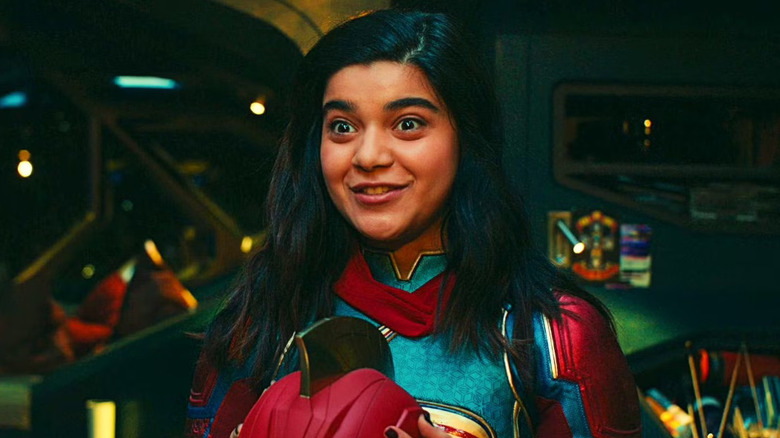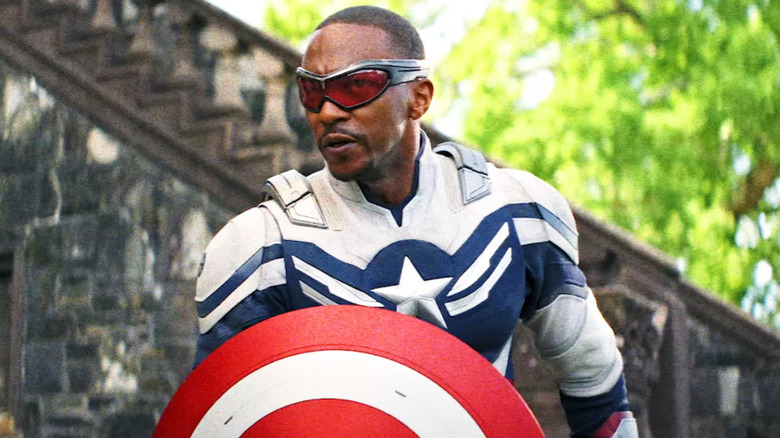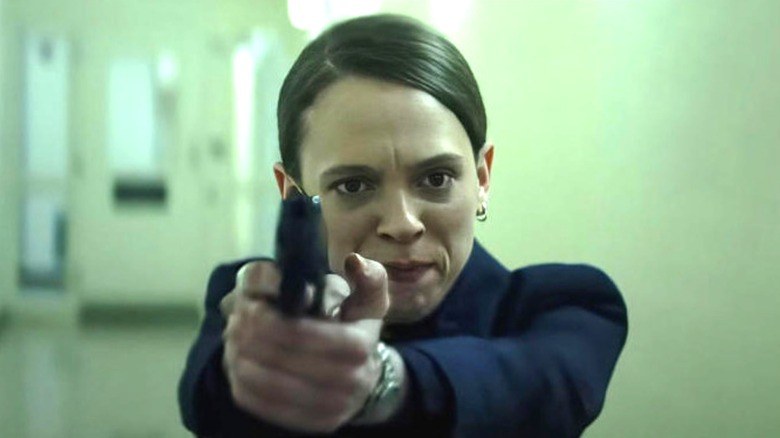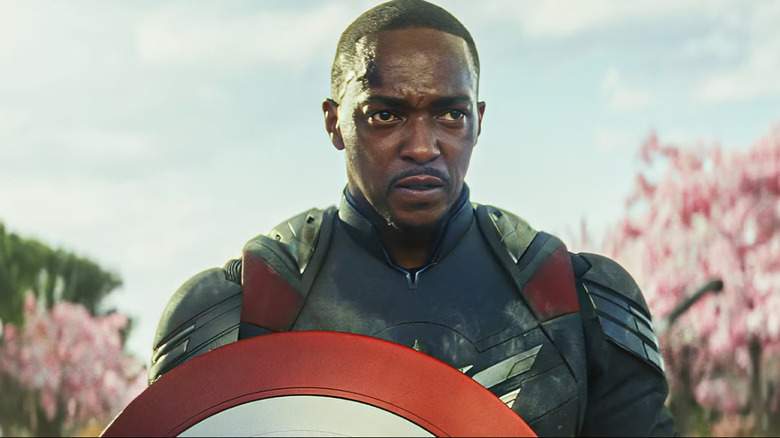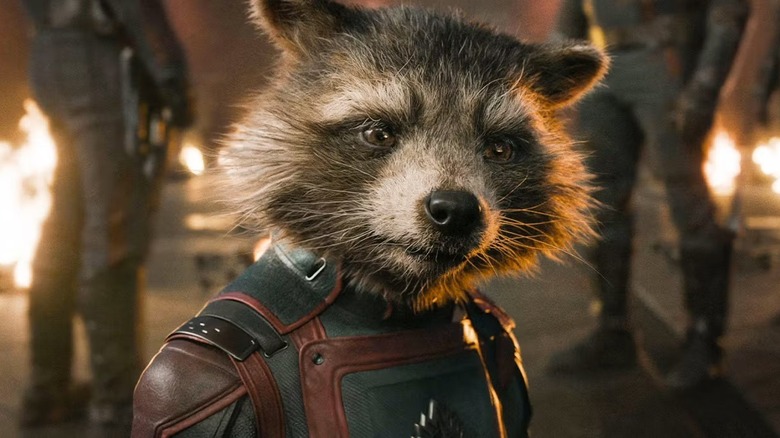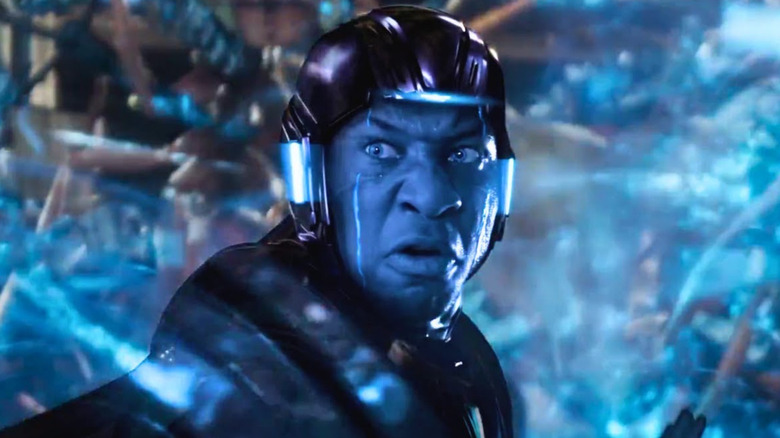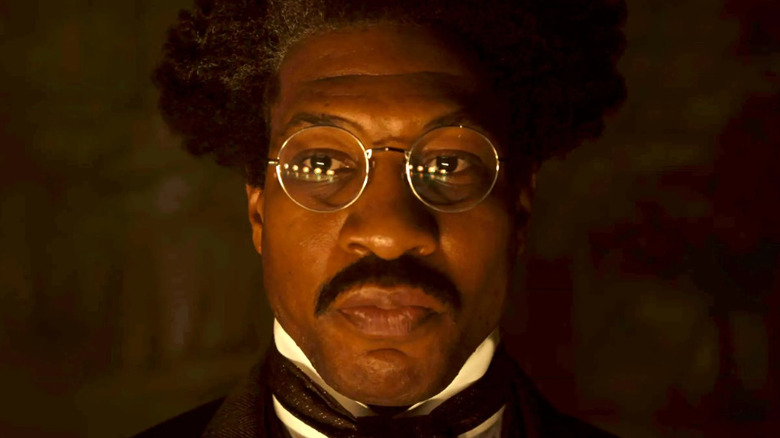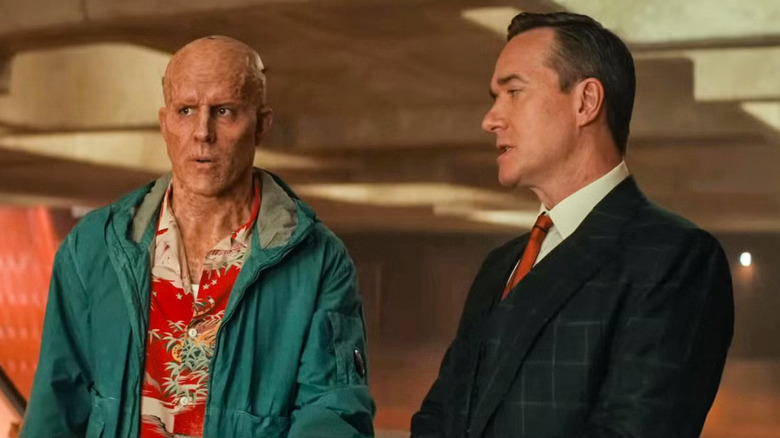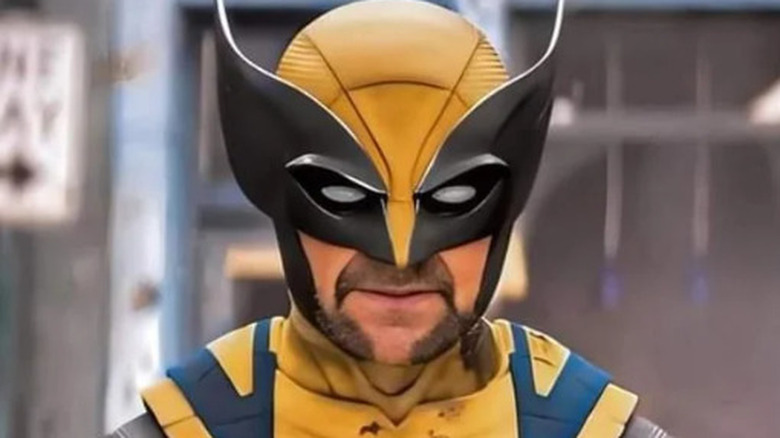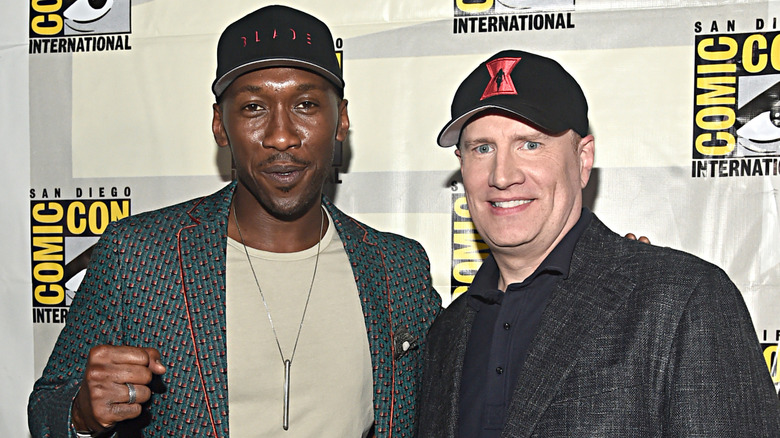Dumb Things We've Ignored In Phase 5 Of The MCU
The Marvel Cinematic Universe timeline stretches back to 2008's "Iron Man," which was followed by films starring the Hulk, Thor, and Captain America, weaving an intricate narrative that culminated in a big team-up film, 2012's "The Avengers." The MCU became a pop culture juggernaut in the years that followed, with 2018's "Avengers: Infinity War" and 2019's "Avengers: Endgame" both pulling in over $2 billion at the worldwide box office. This two-part event cemented the MCU as Hollywood's most dominant franchise by far, but times have changed.
The 2020s has not been as kind to Marvel Studios in terms of box office receipts. There's been the odd success ("Spider-Man: No Way Home" and "Deadpool & Wolverine" both broke the billion dollar barrier), but those kinds of figures are now a rarity. At the time of this writing, 2025's "Captain America: Brave New World" has made less than $390 million globally. What's behind this downturn in fortunes? Superhero fatigue is partly to blame, but we also can't ignore the fact that Phase 5 of the MCU (which began with the critically maligned "Ant-Man and the Wasp: Quantumania" in February 2023) has gotten pretty silly. Below are the dumbest things that have happened in Phase 5.
Did Kamala Khan doom an entire planet?
One of the highlights of 2023's "The Marvels" is Iman Vellani's portrayal of Kamala Khan, aka Ms. Marvel. However, one of the dumb things about this film is actually a plot point involving Vellani's character. The film itself follows three people with energy-based powers, the titular "Marvels." The group consists of Carol Danvers, aka Captain Marvel (Brie Larson); Photon, aka Monica Rambeau (Teyonah Parris); and the aforementioned Ms. Marvel. At one point, our heroes arrive at the song-and-dance planet Aladna to stop the villain's plan of sucking up Aladna's ocean.
Earlier in the film, Carol told Kamala about the difficult decisions she's had to make as Captain Marvel. While she is extremely powerful, Carol's not able to save everyone. It's especially hard for her considering that — due to her immense powers — Carol's jurisdiction is essentially the entire universe. So, when the fight on Aladna gets dire, Kamala impulsively warps the Marvels away to "prove" to Carol that she can make morally-compromising decisions, too. Kamala basically lets the villain succeed in decimating the planet to make a point, which is a bigger character assassination than the time the comics literally killed Ms. Marvel.
What is Sam's jurisdiction as Captain America?
The Marvel Cinematic Universe has a conflicted view on the morality of vigilantism. Yes, the franchise's superheroes stand up to injustice, especially when the actual justice system is shown to be ineffectual and/or corrupt. However, some of the best superhero stories are about the dangers of vigilantism. Sometimes we see an attempt to bypass that contradiction by making the heroes part of the system itself, like most incarnations of Captain America. Though, even in Captain America's case, that's not always true.
In the comics, the Watergate scandal disturbed Steve Rogers so much that he went rogue as Nomad. Similarly, by the time Sam Wilson takes the shield from Rogers in the MCU, the Avengers have effectively disbanded and he's not working officially for the government. So why does "Brave New World" open with Sam having a Captain America lair and access to all sorts of tech? Who's funding him? It was established that he wasn't being paid in "The Falcon and the Winter Soldier," and he struggled financially. What changed? Without official government backing, how was he getting intel and backup from U.S. soldiers at the start of the film? It really makes no sense for a contractor to have such insane resources.
Adding Sabra to the MCU
While "Captain America: Brave New World" brought back a few characters from years gone by, it also introduced new characters from the comic books in live-action for the first time. This includes Sabra (Shira Haas), who in the comics is essentially the Israeli version of Captain America. Amid potential backlash, though, Marvel confirmed a big change to Sabra's character: Instead of being a former Mossad agent, as she is in the comics, Sabra in the MCU is now a former Red Room Black Widow, who was presumably freed at the end of 2021's "Black Widow." Then (for some reason) she became the head of security for Harrison Ford's President Ross.
It's not at all surprising that Marvel made this change given the tense political climate in the Middle East. But, putting politics aside, Sabra also just really has no place in the story. At first, she starts out like Tommy Lee Jones in "The Fugitive," chasing down Sam Wilson, but that's dropped quickly. Furthermore, this character could be anyone, even another comic book character — there's really no need for it to be Sabra. She only wears her costume in one scene and she doesn't even fight in it (which was probably for the best, since it looks like something dug out of the "Power Rangers" wardrobe). The character's inclusion is just one of several dumb things about "Captain America: Brave New World."
Why doesn't Sam take the super serum?
The question of whether or not Sam Wilson should take the super serum is something that hangs over the entire runtime of "Captain America: Brave New World." That's because, as skilled a fighter as Sam is, he is not superhuman, and that's a serious disadvantage in his line of work. Of course, there is a clear thematic point being made by his refusal to take it. This is expressed most explicitly during the scene where Bucky Barnes shows up for a cameo, giving Sam a pep talk after his own Falcon, Joaquin Torres, is injured during a mission. Bucky essentially tells Sam that his bravery and heroism — all despite a lack of superpowers — proves that anyone can be a hero, possibly inspiring others to fight, too. Joaquin later expresses the same sentiment.
That's all well and good, but the fact remains that by not taking the serum, Sam is handing an advantage to the people who would seek to harm him and harm America. There are no doubt countless would-be Captain Americas out there who would happily take the serum and fight for their country on an even playing field with all the superpowered villains that exist in the MCU. Also, the idea that Sam is inspiring people by being a normal guy is kind of dumb — Sam utilizes high-tech gadgetry from Wakanda and elsewhere that is inaccessible to the average person, and he clearly has more military connections than your average former soldier. His refusal to take the serum is a nice idea, but when you boil it down, it makes little sense.
Inconsistent morals in Guardians of the Galaxy Vol. 3
The "Guardians of the Galaxy" trilogy is a real success story within the MCU. James Gunn took a bunch of characters that few people outside of comic book circles had heard of and turned them into well-known superheroes. All three entries did well with critics, though 2023's "Guardians of the Galaxy Vol. 3" scored lowest on Rotten Tomatoes with a rating of 82%. The film fell prey to something that plagues many mainstream popcorn flicks: The trope where the heroes will mow down countless faceless — or at least nameless — henchmen while keeping the main villain alive to make some sort of moral point.
This is especially galling as we witness Peter Quill and Rocket Raccoon wipe out not just the aforementioned henchmen, but also animals who were genetically mutated against their will by The High Evolutionary. In the end, Rocket for some reason draws the line at killing the aforementioned villain, who is a canonically genocidal, planet-destroying threat. It's also weird that the first mission of the new Guardians team led by Rocket in the mid-credits scene sees them killing alien animals. Sure, it's to protect a village, but also, Rocket was a regular animal himself at one point. The morality is all over the place.
Kang being defeated by a bunch of ants
It's common knowledge among both Marvel fans and moviegoers in general that Jonathan Majors' villain Kang the Conqueror was supposed to be the big bad of the Marvel Cinematic Universe's fifth phase. Majors lost the role after being found guilty on misdemeanor assault and harassment charges, meaning that Marvel's original plans leading up to the previously announced film "Avengers: The Kang Dynasty" had to be scrapped. However, even before the court case, there were some problems with Majors' character in the MCU.
Kang technically made his debut in Phase 4 during the finale of "Loki" Season 1, calling himself He Who Remains. His feature film debut came in 2023's "Ant-Man and the Wasp: Quantumania." This Kang variant is the one who started the multiversal war in the first place, and, because of that, is presumably the most powerful and dangerous — that's why the other Kang variants worked together to try and strip him of his futuristic tech and leave him to die in the Quantum Realm.
First impressions are everything when it comes to superhero movie villains, and Kang's film introduction botched what should've gotten fans excited to see more of him. "Ant-Man and the Wasp: Quantumania" made him look ineffectual and, to put it bluntly, like a bit of a joke. The manner of his defeat is comical (he's basically overwhelmed by a swarm of ants), and while that might be acceptable for a one-and-done villain, the fact that Kang went down like this was pretty dumb.
Jonathan Majors' distracting voice as Victor Timely
Jonathan Majors' performance is one of the six best things in "Ant-Man and the Wasp: Quantumania," where the script failed the actor rather than the other way around. The same cannot be said of his performance as Victor Timely (which is quite possibly the most distractingly on-the-nose name in the Marvel Cinematic Universe). In both "Loki" and his brief appearance in the second post-credits scene of "Ant-Man and the Wasp: Quantumania," Majors gives Victor Timely a voice that's distracting, and, frankly, dumb.
Sure, it's distinct, and Timely's nasally staccato rhythm does make a certain amount of sense in terms of him being an eccentric showman from the 1800s. The fact that Majors was going to be portraying multiple Kang variants meant making them distinct was necessary. However, even though there are narrative reasons to go with a voice that is unique, it still doesn't change the fact that it's very grating. It turns the character into something from a comedy sketch rather than a bright mind with ideas ahead of his time.
Mr. Paradox's actions in Deadpool & Wolverine
One of the biggest unanswered questions in "Deadpool & Wolverine" revolves around the villain of the film, Matthew Macfadyen's Mr. Paradox. Why did he tell Deadpool his whole evil plot? It's never a smart thing for a bad guy to do, but it's extra dumb here. At the beginning of the film, Wade Wilson has given up his persona as Deadpool, the rambunctious, fourth wall breaking Merc with a Mouth. Wade feels like he lacks purpose (especially after he used the time-traveling device he got from Cable in "Deadpool 2" to apply for The Avengers, only to be rejected by Happy Hogan). Wade eventually gets captured by agents of the Time Variance Authority and brought to Mr. Paradox, who tells Wade how important he is.
So far, so good. However, things get dumb when Paradox inexplicably monologues about how he's going to destroy Wade's universe and is using a new, experimental machine to speed up the process. This obviously annoys Deadpool, as it means his friends will be time-ripped. Mr. Paradox's motivations make a certain amount of sense at first, because he says Deadpool is meant to be kept alive by the "higher-ups." However, that makes less sense when it's later revealed that Mr. Paradox is working against the TVA, and his Time Ripper machine is a secret. If that's the case, then why bring Wade in at all? And, again, why tell Wade his plan? It's never made clear what Paradox gained from doing that — in fact, his plan might have actually succeeded if he hadn't.
Wolverine's white pupils make the mask look worse
Superhero comic books often contain certain visual elements that don't adhere to how things look in reality but make sense in a more abstract way (or just look really cool). Case in point: Masked heroes whose eyes become pure white while wearing them. The most obvious example is, of course, Batman, but there are countless others, including Deadpool and Marvels' most famous X-Man, Wolverine.
The critical and commercial success of the live-action "X-Men" adaptation from 2000 marked a big moment in the history of comic book films. This movie is widely considered to be the one that laid the foundation for the modern superhero cinematic landscape. It took cues from "Blade" in terms of wardrobe choices, doing away with the colorful costumes seen in the comics in favor of dark clothing and lots of leather. Cyclops even makes fun of wearing "yellow spandex" in a famous line from "X-Men." Luckily, fans finally saw Hugh Jackman don the iconic yellow suit in "Deadpool & Wolverine," which looks surprisingly good in live-action. Well, apart from the mask — or, more specifically, the eyes.
The whole white, pupil-less eyes thing looks great on the page, but in live-action, it can be very distracting. It's also not really necessary – Wolverine's actual eyes do show through the mask in the comics sometimes. Not only does it look like a Halloween costume in live-action, but you lose out on Jackman's emoting by hiding his eyes. Deadpool's inherent goofiness — and the fact the comics never show his pupils — means that this approach works for him, but it looks dumb on Wolverine.
Still no Blade despite him being teased in Eternals
The first big-budget feature film starring a Marvel comics character was 1986's "Howard the Duck," which was a total flop. More than a decade passed before a film came out that proved how well-suited certain Marvel characters are to the big screen: 1998's "Blade." The live-action feature film starred Wesley Snipes as the titular, leather trench coat-wearing vampire hunter. Snipes and many of his co-stars didn't really resemble the characters from the comics (here's what the cast of "Blade" should really look like), but the aesthetic provided a blueprint for similar movies and kicked off new trends (here's how "Blade" changed superhero movies and nobody noticed).
In short, "Blade" was a big hit that made a cultural splash, so there was a lot of excitement in 2019 when Kevin Feige announced that the MCU would be rebooting the property with Mahershala Ali in the lead role. The reboot was supposed to be coming in the near future — Ali even had a voice cameo in 2021's "Eternals." Sadly, the project has slowly sunk into development hell. Multiple writers and directors have come and gone, and it's become such a tortured production that "Deadpool & Wolverine" even poked fun at it: Wesley Snipes (who cameos as his version of Blade in the film) said that he's the only Blade.
Given the vast resources at their disposal and the fact that Phase 5 has been light on big-draw projects, the fact that Marvel execs didn't go all out to make the "Blade" reboot happen really is dumb. Hopefully we get to see it one day, but at this point, we're not holding our breath.

